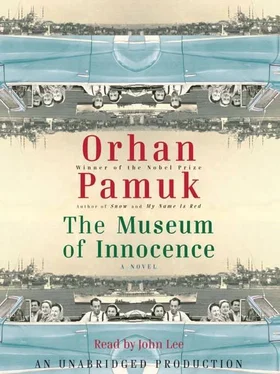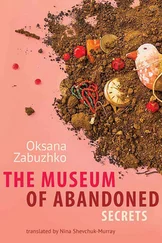“What happened to that German model of yours?” Sibel asked Zaim. “Did you ditch her like all the others?”
“Inge wasn’t my lover. She’s gone back to Germany.” Zaim spoke without losing any of his good humor. “We were just business associates, and I was only taking her out to show her Istanbul by night.”
“So you’re telling me you were just friends,” said Sibel, using one of the expressions newly popularized by the celebrity magazines.
“I saw her today, at the cinema,” said Berrin. “She turned up on the screen, sipping that soft drink with that same beckoning smile.” She turned to her husband. “I went at lunchtime-the power was out at the hairdresser’s. I went to the Site-it was Jean Gabin with Sophia Loren.” She turned to Zaim. “I see her everywhere-in every single kiosk in the city; and it’s not just children drinking Meltem now, it’s everyone. You’re to be congratulated.”
“We timed it well,” said Zaim. “We’ve been lucky, too.”
Seeing the puzzlement in Nurcihan’s eyes, and knowing that Zaim would expect me to explain, I quickly informed Nurcihan that my friend was the owner of Şektaş, the company that had recently launched Meltem, and that he’d also introduced us to Inge, a lovely German model who could be seen in the advertisements all over the city.
“Have you had the opportunity to taste our fruit-flavored soft drinks?”
“Of course I have. I especially liked the strawberry,” said Nurcihan. “Even the French haven’t been able to put out something that good in years.”
“Do you live in France?” asked Zaim.
Zaim invited all of us to visit the factory that weekend, also promising a Bosphorus cruise and a picnic in Belgrade Forest just outside the city limits. The entire table watched him and Nurcihan. A short while later they got up to dance.
“Go find Mehmet,” said Sibel. “Get him to rescue Nurcihan from Zaim.”
“Are we sure she wants to be rescued?”
“I don’t want to see my friend swallowed whole by this embarrassing Casanova whose only ambition in life is to lure girls into bed.”
“Zaim has a very good heart, and he’s honest. He just has a weakness for women. Can’t Nurcihan have a bit of fun here as she did in France? Is it absolutely necessary for her to get married?”
“French men don’t look down on a woman just because she’s slept with a man before marriage,” said Sibel. “But here even a little fun can get you a reputation. Besides, I don’t want to see Mehmet’s heart broken.”
“I don’t either. But I also don’t want other people’s love affairs to overshadow our engagement.”
“You don’t seem to appreciate the pleasures of matchmaking,” said Sibel. “If these two get married, just think of it, Nurcihan and Mehmet could be our closest friends for years.”
“I doubt Mehmet is going to be able to peel Nurcihan away from Zaim tonight. He shies away from confrontations with other men at parties.”
“That’s why you have to go have a word with him, tell him not to be scared. I’ll handle Nurcihan, don’t you worry. Go-go and bring him back here right away.” As I stood up she gave me a tender smile. “You’re very handsome,” she said. “Don’t stop and gab. Come back at once and take me off to dance.”
It had occurred to me that I might run into Füsun as I made my way from table to table in search of Mehmet, through the crowds of merry, shouting, half-intoxicated revelers, shaking my hand. There were three friends of my mother’s who had come to our house every Wednesday during my childhood to play bezique. With the same spontaneity that must have prompted them all to dye their hair the exact same shade of brown, they and their three husbands simultaneously began waving to me from their table, calling “Ke-maaaal” as if summoning a child. Next I saw an importer friend of my father’s who ten years later would be notorious for bringing down the minister of customs and excise who’d asked him for an obscenely large bribe, which he’d delivered inside an enormous baklava box packed with stacks of bills with a picture of Antep on the top. He’d later released to the public verbatim the intimate conversation that had ensued, recorded on the tape machine he’d secured under his arm with Gazo brand tape. He is now etched in my memory with his white tuxedo, his gold cuff links, his manicured nails that were doused in the perfume that remained on my hand long after he shook it.
As it was with so many of the faces in the photographs my mother trimmed so meticulously for arrangement in our albums, I found many of the faces in the crowd so familiar, so close, that it made me terribly uneasy when I was unable to work out the relations among them-who was whose husband, or whose sister.
“Kemal darling,” said an amiable middle-aged woman at just that moment. “Do you remember proposing to me when you were six years old?” It was only when I saw her stunning eighteen-year-old daughter that I recognized her. “Oh, Aunt Meral, your daughter looks just as you did then!” I said to my mother’s second cousin. When the mother told me that they were regretfully obliged to leave early, because the daughter was taking the university exam the next day, I realized that between me and my jovial aunt there were as many years-twelve, to be exact-as between me and her gorgeous daughter, an awareness that produced a momentary stupor, before I yielded to the urge to glance in the very direction I had been avoiding, but Füsun was not visible at the table in the back or on the crowded dance floor. It was shortly thereafter that this photograph was taken of me with “Ship-Sinker Güven,” who ran an insurance company. You can’t see my face, just my hand in the photo that I acquired years later from a collector whose home was littered with piles and piles of photographs of weddings and other parties from the Hilton. In another that would be taken three seconds later, the gentleman banker in the background would be shaking my hand, having introduced himself as an associate of Sibel’s father, this revelation having caused me to remember with some surprise that every time-that is to say, both times-I had been to Harrods in London, I’d seen this gentleman banker lost in thought as he was picking out an appropriately dark suit for himself.
Making my way through the crowd, stopping to pose for souvenir photographs, I marveled at how many brunettes had bleached their hair blond; and how many of the rich, flashy men were wearing almost identical ties, watches, rings, and thick-soled shoes, and how their mustaches and sideburns were trimmed to equally disturbing uniformity, but at the same time I recalled that I knew them all and that we had many fond memories in common, and this was enough to stir a wave of nostalgia, and also wonderment at the blessed life before me, and the unparalleled beauty of the summer evening that carried the scent of mimosa. I greeted Turkey’s first Miss Europe, who had, after the age of forty, and two failed marriages, devoted herself to fund-raising balls sponsored by associations working on behalf of the poor, the disabled, and the orphaned (“Forget idealism, my dear, she takes a percentage,” my mother used to say), and who visited my father’s office once every two months, seeking his support. I remarked on the beauty of the evening to the lady whose shipping magnate husband had been shot in the eye and killed during a family feud, and who had, ever after, been teary-eyed at family gatherings. It was with great respect that I shook the soft hand of Celâl Salik (I display a column by him here), then Turkey ’s best-loved, strangest, and most courageous columnist. I sat down for a photograph with the sons, daughter, and grandchildren of the late Cevdet Bey, one of Istanbul ’s first Muslim businessmen. At another table of some guests invited by Sibel, I entered into a wager about the likely outcome of The Fugitive , the television series that had captivated all of Turkey and whose final episode was to be aired the following Wednesday: Dr. Richard Kimble had been hunted down for a crime he didn’t commit, and being unable to prove his innocence, would always, always be on the run!
Читать дальше












